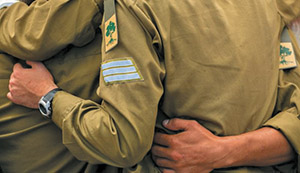
Not one, but two sons, did Gil and Esther Alexander lose to suicide. And as devastating an ordeal as this would be for any family, it is that much harder in the Orthodox Jewish community, where few subjects are more taboo.
The Alexander family had lived for 28 years on Ein Hanatziv, a religious kibbutz in Israel’s Beit She’an Valley. In March 1995, their son Amit, then a 19-year-old soldier and the oldest of their seven children, shot himself while sitting alone on guard duty. It was the first reported case of suicide at that time among the cluster of religious kibbutzim situated in that part of the country.
Thirteen years later, another son, Yotam, who was by then married and studying in a yeshiva that combines learning with military service, walked out of the synagogue in the middle of the morning prayer service and shot himself dead.
Against Your Will, a 50-minute documentary by Assaf Banitt produced by The Second Authority for Television and Radio, tells the story of Gil and Esther Alexander’s courageous struggle to raise awareness of suicide in the religious community following their own heartbreaking ordeal. The film will have its first showing next month at Docaviv, Israel’s premier documentary film festival.
Except in rare instances, suicide is prohibited in Jewish law and considered a serious sin. Hence the strong disinclination to address the subject in the Orthodox world.
When their first son was found dead, as Gil and Esther recount in the film, several members of the kibbutz, while paying them a condolence call, took them aside and encouraged them to refer to the incident as an “accident” rather than suicide.
“To refer to it as an accident when everyone around us would be whispering suicide?” wonders Gil many years later. “Suicide isn’t a comfortable word, but that’s what happened.”
Amit Alexander had fulfilled his dream of joining an elite army unit and had not, according to the family, given them any indication that he might be suffering from depression or any other emotional crisis. As his parents recall, he was a model son who had everything going for him, including good grades and athletic prowess. As part of his basic training in the army, he was participating in a rather grueling march when he suddenly found himself out of breath and had to be carried on a stretcher by his army buddies the rest of the way. When one of them asked him afterward how he was doing, his response, in that friend’s words, was: “physically fine, mentally awful.” It was not long thereafter that he put a gun to his head.
His parents make a point each year of meeting with new recruits in this unit and sharing Amit’s story, so that these young boys will learn how to recognize the warning signals if and when they appear. The Alexanders have also taken their campaign to Orthodox rabbis and educators, encouraging them to enlist professionals in the battle against suicide.
In one scene where Yotam’s former yeshiva friends ruminate over the circumstances of his death, a young man observes: “It’s hard to imagine a situation where you would go to your rabbi with a problem and he would tell you to speak to a psychologist.”
In the Israeli army, suicide is also a taboo subject, and for many years an off-limits topic. The latest figures published by the Israel Defense Forces show that suicide in the army has declined in recent years, with 10 soldiers reported to have taken their own lives last year. They included three soldiers who had fought in the summer’s war with Gaza.
Esther and Gil’s determination to speak openly about their tragedy does not go over well at times—not even in their own home. Their youngest son, Binyamin, is eager to join an elite combat army unit, but as he informs his parents, whenever he speaks frankly about how his brothers died, he does not get called back for further interviews. “When I say it was an accident, though, then I do,” Binyamin told them.
Having already lost two sons while serving in the military, Esther and Gil are fiercely opposed to signing the waiver required for their youngest son to serve in a combat unit. The resulting tensions between the parents and child forced Binyamin to finally open up and share his anger and bitterness at his dead brothers, in what proves to be a cathartic moment for the entire family.
Her overwhelming grief at times challenges Esther’s faith in God, and as she acknowledges in the film, since the death of her sons, she finds it difficult to get up each morning and pray. Her husband, however, has not lost his faith and encourages his wife to “practice” as a way of recuperation.
To cope with her losses, Esther pours out her heart in handwritten letters to her two dead sons. In a particularly poignant one addressed to Yotam, where she questions what sins she has committed to deserve her fate, she writes: “True, I have remained a mother to five children, and objectively, that is a lot. But my feeling is that it’s so little to be a mother to just five children, while it’s so much to be a mother to two dead boys.”
By Judy Maltz, reprinted with permission from Haaretz.com













